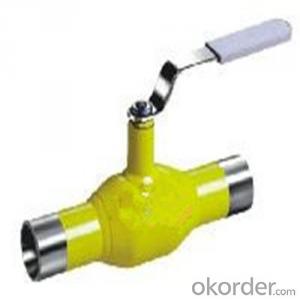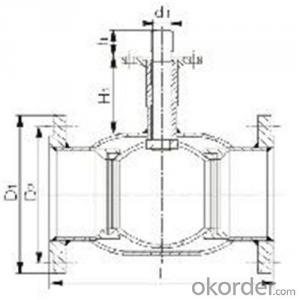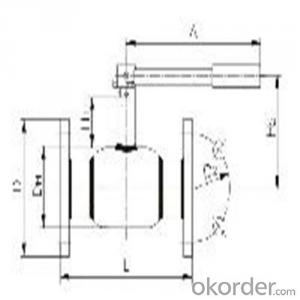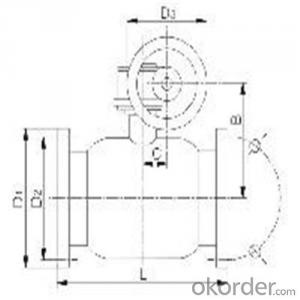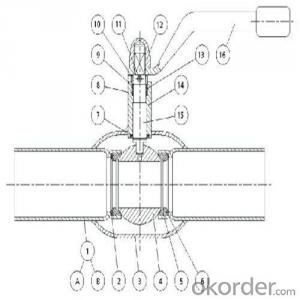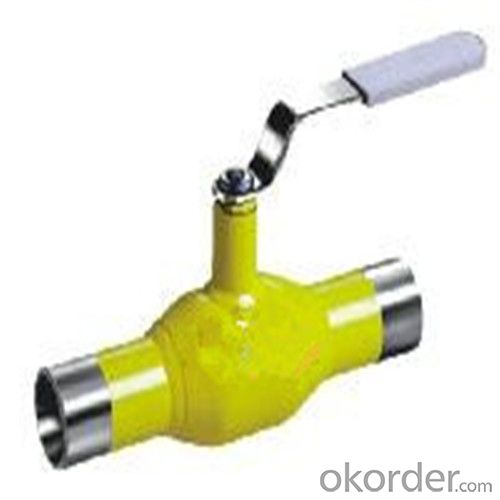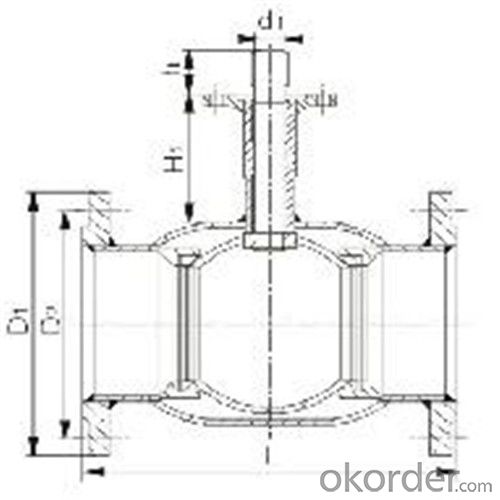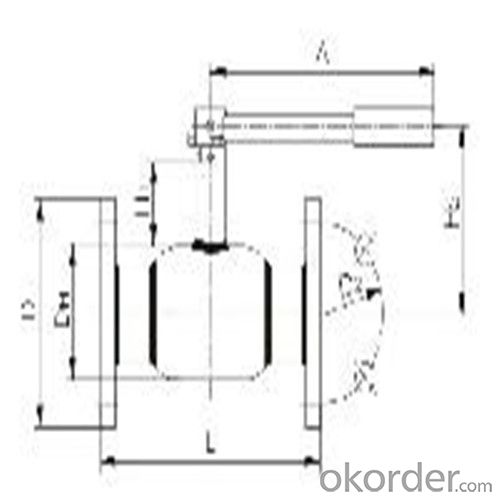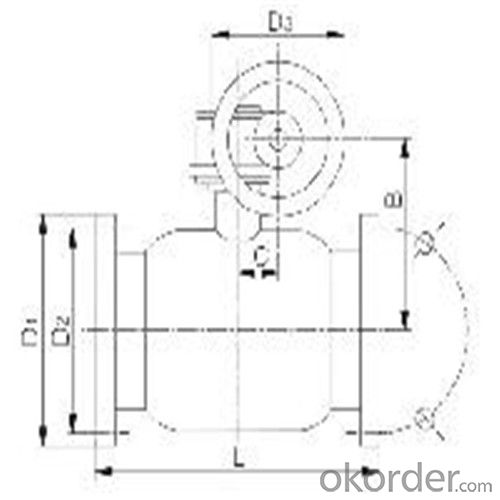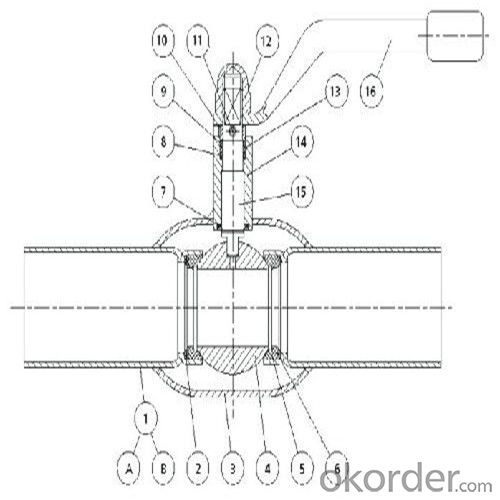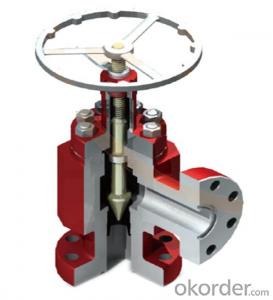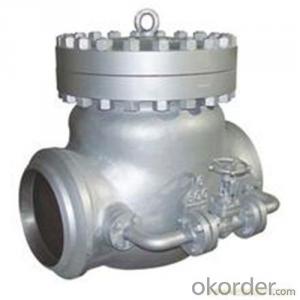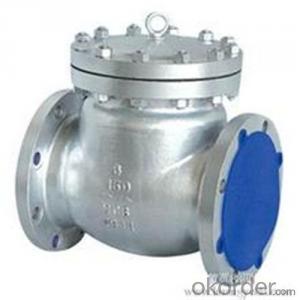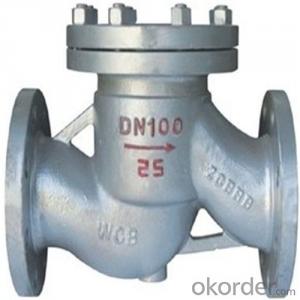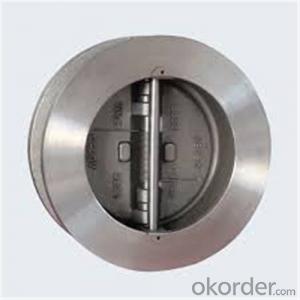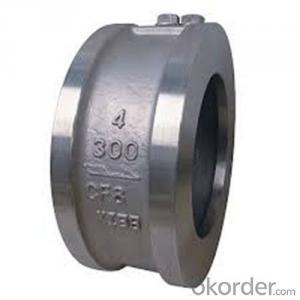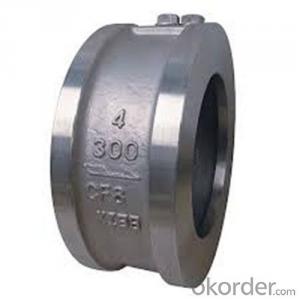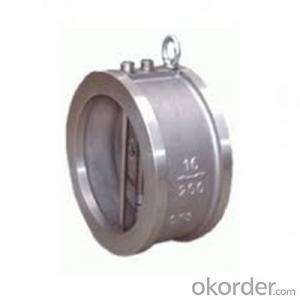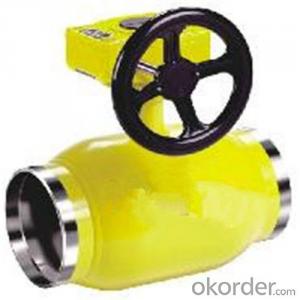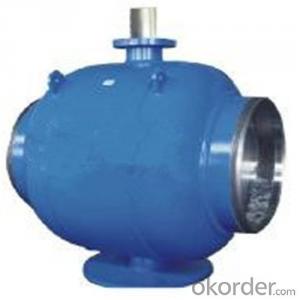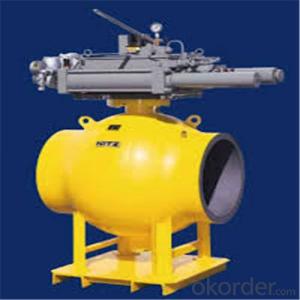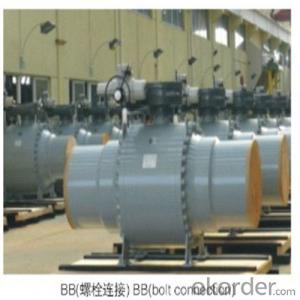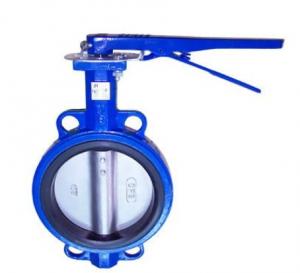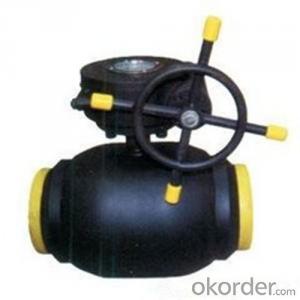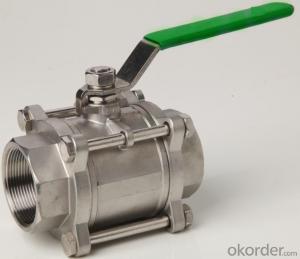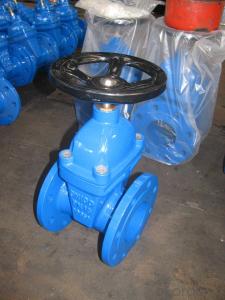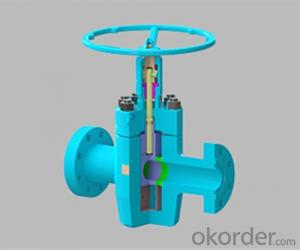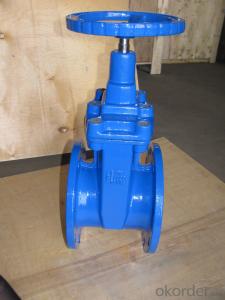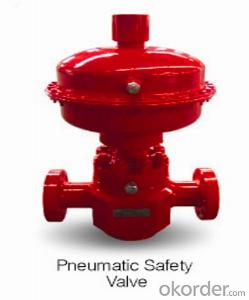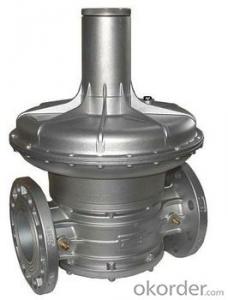Ball Valve For Heating Supply PN 1.6 Mpa
- Loading Port:
- Shanghai
- Payment Terms:
- TT OR LC
- Min Order Qty:
- 100 pc
- Supply Capability:
- 1000 pc/month
OKorder Service Pledge
OKorder Financial Service
You Might Also Like
Ball Valve For Heating Supply
Product Description of Ball valve for heating supply:
Technical introduction
★The ball valve is designed as fully welded structure,which can prevent the leakage of medium.
★The valve seat is floating and spring-loade.The seal is made of soft seal materials of PTFE+20%C and Viton B.The seat is tightly abutted against the ball surface by the pressure of a spring,so that even if the media is in low pressure,a reliable sealing can be assured for the ball valve.Double piston effect and double seal(two-seal seat)are adopted in specially designed valve seat to realize double sealing,which makes the tightness of the ball valve more advantageous and the operation easier.
★A floating ball is adopted for DN15-DN200,and a stem and trunnion ball is adopted for DN200 and above,which can ensure the accurate position of different size ball.In other words,the sealing performance,low torque valve and operability can be guaranteed.
★The sealing of the stem is fulfilled by two replaceable O-rings and packing consisting of PTEE+20%C or flexible graphite,as the packing seal material,is fire proof effect,and is specially suitable for fuel gas systems.
★The materials used for the valve body and pipelines are the same(carbon steel or SS steel),valve body and stem adopt SS steel and the packing adopts PTEE+20%C which is corrosion-resistance or flexible graphite.
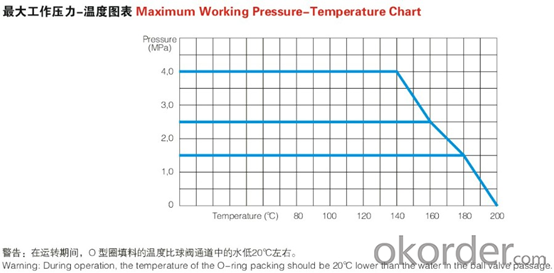
Design Features of Ball valve for heating supply:
Features and Applications
Raymond's fully welded ball valve for heating supplyand Fuel Gas systemare used to control the flow at fully open or closed position,not regulate the flow.Only special types of ball valves can realize the flow regulation.Therefore,our welded ball valves can satisfy the requirements of heating systems,e.g:
★Main pipelines of heating equipment
★Cross channels of heating pipes
★Heat exchanger station and any long distance operating station,e.g:
For the transmission of hot water and two kinds of mixed media(water,air or natural gas),limited to Max.4.0MPa and 200°C.
For the transmission of natural gas and one medium,from -30°C to 60°C,and even up to 150°C using specially designed ball valves.
★Coal gas pipelines,trunk and the branch supply lines.
Standard of Ball valve for heating supply:
Actuator | Gear Handwheel customize |
Connection | Flange SW Weld customize |
Medium | Gas Natural gas Water customize |
Medium Temperature | <200℃ customize |
Application Fields | Electricity Medical Petrochemical customize |
Connection Standard | EN 1092-1 EN 12627 ISO 7-1 customize |
FAQ of Ball valve for heating supply:
Q1:I can’t find the type of steel check valve which I need. what can I do?
The chart above only lists out some common composition of steel check valve parts.We may provide other different parts material composition according to the customer's request or the actual valve working condition.
Q2:Which certification do your products pass?
Our products are in accordance with ISO 9001、ISO 14001、API 6A、API 6D、TS CE、API607/6FA/BS6755.
Q3:How can I place an order?
The only one thing you should do is to tell us the sepecification about type 、quantity and mode of transportation, then we will send you quotation within 24 hours.
- Q: I was told Wed. that I need to have my aortic valve replaced. I was wondering if anyone could share their experience with this surgery good or bad. I am meeting with the surgeon on the 26th, and am very nervous. Any tips and or suggestions appreciated. I'm a 39 year old female.Thanks in advance
- This is a routine, well established procedure. The incidence of major complications are less than 4%. There are two kinds of artificial Heart Valves. One is mechanical, and the other is tissue valve. The mechanical valve requires the person to be on life long anti-coagulation therapy. This also requires periodic check on the persons pro thrombin time. Based on this, the anti-coaglation dose will be adjusted. The problem with anti-coagulation is that it may lead to bleeding complications. The tissue valve is made from the tissues of a bovine or porcine heart. The tissue is denatured to ensure that the valve is not rejected as a foreign tissue. (This is not a problem with mechanical valves.) Being made of tissue, these valves do not allow clots to form, which means that anti-coagulation after a short initial period is not required. This is a major advantage, especially for women, who may have some earlier bleeding problems. Then why are mechanical valves used at all? Being made from non-living denatured tissue, tissue valves cannot repair themselves. They also tend to get calcified in younger people with more calcium activity. They also have a shorter life than mechanical valves. Surgeons tend to favour mechanical valves for younger people (whose life expectancy is higher), and the tissue valve for the older, as such people may already have some bleeding problems, the valve's durability is not critical and the patient has lower calcium activity. These are general considerations. Only a surgeon armed with the full test results, and a knowledge of the patient history, who can advise the patient on what is the best option in each case. To reiterate, AVR (Aortic Valve Replacement, not my initials) is a routine procedure and recovery tends to be uneventful. Wish you all the best, and as uneventful a recovery as possible.
- Q: I have a question over my car. When a valve cover gasket(s) has a leak, will it still leak even after car has been off for a few days. It has also been starting to smoke after it has been on for 5 minutes. I don't move it. Thanks.
- If the valve cover gasket is leaking oil tends to drip down on to the exhaust manifold. Then when you start the engine and the exhaust warms up (about 5 mins) it starts to smoke. So fix the leak by replacing the gasket and the problem goes away,
- Q: in confederacy of dunces when ignatius talks about his valve closing all the time. is he talking about a throat valve or his he talking about like some intestinal valve? my mom says it's his intestinal valve, but i think he's got asthma or something and he's talking about his throat
- Suffering the trauma of the downward cycle, Ignatius confines himself to his bedroom, where he chronicles his version of history on tablets of Big Chief paper. Further, the stress of these incidents is manifesting itself physically. They have caused his pyloric valve to close--an ailment he suffers anytime he is subjected to anxiety and stress. With his valve sealed shut, gas fills his stomach, and he becomes severely bloated. In an attempt to pry his valve open, Ignatius lays on his stomach and begins bounhing up and down on his bed. Though it does not open the valve, the bouncing does cause a small erection, to which Ignatius decides to tend. Visualizing his childhood dog, Rex, he brings himself to climax.
- Q: Liquid propane leaving the reflux pump of a distillation column flows through a 3.5 in ID pipe at a flowrate of 90 lbm/s. There is a flowrate control valve in this line, and it is set such that the pressure drop across the valve (delta)P=15 lbf/in^2. Upstream of the valve , the pressure P1=18 bar and the temperature T1=310 K. Assume there is negligible heat transfer with the surroundings and that the density of the liquid does not change significantly.a) What is the kinetic energy change across the valve?b) What is the enthalpy change across the valve?c) What is the temperature change across the valve?d) What is the entropy change across the valve?
- If there is NO change in the density of liquid propane as it passes through the valve, and if the size (area) of the pipe upstream and downstream of the valve is the same, then a) there will be no change in the velocity of propane, hence there will be no kinetic energy change. b) this is a process of throttling, with no change in kinetic energy, hence there is no change in the enthalpy. c) temperature change can be determined using the detailed property table of propane, but if it is an almost-incompressible liquid, then this too, will be negligible. d) dh = T ds + v dp. Since there is no change in h, integrate this along a constant h line from inlet to exit (upstream to downstream) and you will get ds = -(v/T) dp. Since p reduces from inlet to exit, the change in entropy will be positive. This is as expected. If we assume density (=1/v) and temperature (T) to remain constant, then the change in entropy will be s_downstream - s_upstream = (p_upstream - p_downstream) v /T.
- Q: I just installed a iac valve on my 2001 blazer but didnt go through the reset steps. Do i have to unistall and do the steps or go from here with the reset. Truck stalls out now and surges... Or could i just hava a defective part.
- The okorder /
- Q: I was just informed that my 4 year old daughter has been diagnosed with mild mitral valve regurgitation. I have been researching, but only find the information to apply to adults, not children.What general course is taken when dealing with children with this condition and what should I expect? Her pediatrician was treating her symtoms as asthma with breathing treatments, but, I was not comfortable and took her to my family physician, who sent her for the echo, which discovered this.I'm more or less just looking at our options...
- my nephew had it and needed surgery.
- Q: My third valve is always sticking, despite the fact that I oil them thoroughly every other day. It scrapes the sides of the case when I take it out/put it in, it's almost as if the valve is too big for it. Often times it will stick and I'll have to unscrew it and physically pull it out for it to be functional again.I've inspected it, and the inside looks just like the others which are fine. I've tried washing it, oiling it, and putting a trace amount of vaseline on it. What is the problem?
- Check the spring and plastic valve guide on top of the spring. I've seen these stick and the results are quite annoying, but once the spring moves up and down freely, so will the valve.
- Q: A friend of mine is having open-heart surgery next week to replace a heart valve. He needs to decide whether he wants a mechanical valve or a biological one. He is 28 years old. Which would you choose and why?
- Always a tough call. You might want to see if you can find a copy of Lewis Grizzard's book, They Tore Out My Heart and Stomped That Sucker Flat, which was about both his aortic valve and his ex-wives. Unfortunately, he died from surgical complications with I think his third valve replacement, but you needn't tell your friend that part.
- Q: I have varicocele and varicose veins. Both conditions are caused by vein valves becoming damaged or defective. My question is, is this a sign of more serious problems?Thank You
- By following this guide book I was able to eradicate my varicose veins pretty fast. God bless!
- Q: I am looking for a full valve guitar amp for around ?300.It needs to be loud enough to play with a quietish drum kit.Currently i have looked at an epiphone valve senior in both and combo and cab and head form. i have also looked at some smaller amps such as the vox ac4 but am a bit worried about its small size. any advice would be greatly welcome. many thanks in advance.
- Well I have the Valve Jr. and the AC4. The AC4 is a good sounding amp, but even though it is only 1 watt less, the Valve Jr. is much louder. The AC4 is a great practice amp but not enough to jam with a drummer unless he is pretty quiet and you really crank the amp. Never heard one of the new Valve Sr. models but with all of the goodies they added it should sound really good. I had my Jr. modified but it still doesn't have all the cool stuff the Senior has. I think you would really like the Epiphone and at 20 watts you will be more than loud enough. My 5 watt Jr. will get very loud. All I own are low watt class A valve amps, it's the only way to fly!! The Marshall Class 5 might be worth looking at also.
Send your message to us
Ball Valve For Heating Supply PN 1.6 Mpa
- Loading Port:
- Shanghai
- Payment Terms:
- TT OR LC
- Min Order Qty:
- 100 pc
- Supply Capability:
- 1000 pc/month
OKorder Service Pledge
OKorder Financial Service
Similar products
Hot products
Hot Searches
Related keywords
